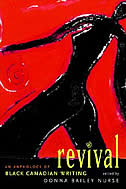|
What is black Canadian writing? What are its defining traits, and what makes it different from other Canadian writing? It seems peculiar to ask these questions, especially since AfroToronto.com is partially dedicated to furthering the very thing we are seeking to define. But the simple fact of advocating a cause does not mean it has been fully defined. And defining Black Canadian writing is not an academic question because it goes to the core of who we are. Nigerian playwright Wole Soyinka wrote that “the arts are a material expression of a people’s humanity.” So, defining our writing is a follow-up to a proper definition of ourselves. So, what does it mean to be Black and Canadian? Author Nalo Hopkinson, quoted in a recent Toronto Star article by our own Laina Dawes, says, "Given our relative youth and diversity as populations, we haven't had the same amount of time as black American populations to have a shared Canadian history and experience around which to cohere." Donna Bailey Nurse views it as a way “to engage in the ongoing interaction between primarily African and European elements.” Other African-Canadian literary greats have provided their own definitions over the years, and some of these voices merge in a recently published anthology entitled Revival. |
The book contains over fifty pieces from twenty-nine of the best writers in the land: from George Elliott Clarke to Lawrence Hill, Andre Alexis, Tessa Watt, Dany Laferriere, Ken Wiwa, and Nourbese Philip. There are also some new names whose work may not be familiar outside of the artsy circles but whose perspective is equally important: Esi Edugyan, Wayde Compton, Motion, and Jemeni, to name a few.
In poetry and prose, Revival highlights many facets of the Black Canadian experience. David Odhiambo depicts disaffection and hopes unfulfilled in a new land that promised so much to so many from far in Kipligat’s Chance. Dany Laferriere in his screen-adapted novel How To Make Love to a Negro pulls Odhiambo’s thread further, albeit with exquisite wit and philosophical analysis. George Elliott Clarke presents rural Nova Scotia with its peculiarities in language and styles. Afua Cooper speaks of her old country, its untold stories and the remnants of a history of oppression in her poem Christopher Columbus:
“The Statue of Columbus stands on the hill facing the sea
(…)
As a little girl in grade four
the teacher would take us to see
this statue, and we would attempt to draw
this conqueror of new lands
(…)
I look again at the statue
And marvel that even today
We still honour our conquerors.”
But the common theme of the pieces in Revival and, in my view, one of the defining elements of Black Canadians is our shared feeling of non-belonging imposed on us by our environment.
For the immigrant, it is caused by exile, a separation from familiar faces and surroundings, the challenges and accusatory glances in the new country, the questions and those small reminders of one’s difference and, in some eyes, exoticism: the human warmth interpreted as “too much emotion,” the criticism of “mainstream ideas” interpreted as “a Third World point of view” and the accent. “Nothing," Althea Prince writes in Loving This Man, “could fill the space that leaving Antigua has made…nothing.”
For the Black Canadian native, it is the constant questioning: “But where are you really from?” the stereotypes, in the words of George Elliott Clarke, the burden “to explain oneself constantly” and again, the subtle references to one’s difference and otherness only this time limited to skin colour but just as hurtful.
So, Black Canadian writing is really about capturing all these fragments of our complex identities and moulding something akin to a common humanity.
Revival is not the first anthology of Black Canadian Writing, Karen Richardson’s T-Dot Griots, Loris Elliott’s Writing by Blacks in Canada and Ayana Black’s Canadian Writers of African Descent are just a few recent publications. However, this latest offering provides glimpses of both the potential and the accomplishments and gives a fitting answer to the question stated above.
Revival: An Anthology of Black Canadian Writing is published by McClelland & Steward and edited by Donna Bailey Nurse. The book is available now at www.amazon.ca.







Comments powered by CComment